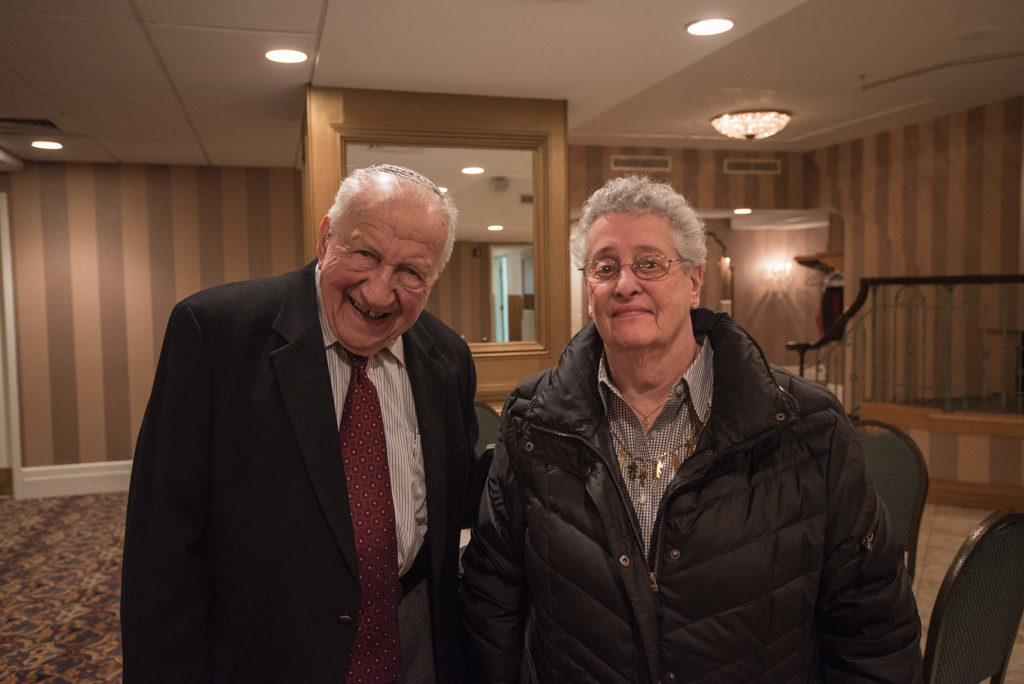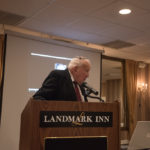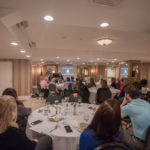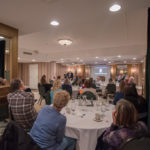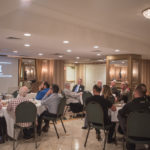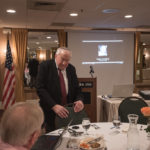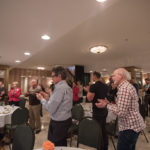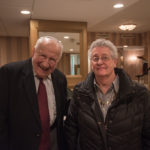Marquette, MI – April 11, 2018 – “Hate is the worst word in the dictionary,” he said. “The H stands for horror or humiliation. The A is for atrocities, the T for torture, and the E for elimination.”
Hate has been the cause of tragedy across the world for hundreds of years. Today, the Marquette West Rotary was joined by a man, who despite his first-person account of tragedy, has an incredible outlook on life. Martin Lowenberg is Jewish. Born in a small village in Central Germany in 1928, by the age of eight he was beaten so badly in school that he couldn’t even stand – simply for being a Jew. By 17 years old he had survived five different concentration camps and ghettos in Germany, Latvia, and other locations around Europe.

Lowenberg explained that he had talked about his time in concentration camps many times and the story would never fit into a mere 30 minutes. He became by talking about what it was like in the camps. Arriving at the first camp at 15 years old, he was forced to work like anyone else ages 15 to 60. When he came to the camp, he was with his parents and his two nine-year-old brothers. During this period, the elderly and the young were “eliminated.” “Only the strong ones were kept,” Lowenberg said. The others were sent to death camps like Auschwitz where the promise “Work Sets You Free” was only met by gas chambers and ovens.

“We were slaves,” he said. While there are machines to cut down and move trees today, in 1941 they did it by hand. The SS forced captives to cut down heavy wet trees, cut them into logs and carry them, all while being yelled at to move faster. Prisoners were forced to dig the war trenches that put them even farther away from their own freedom with frostbitten hands, and they slept on nothing but hard wooden bunks.
A Rotarian asked to hear about his liberation and Lowenberg started again, taking us back to 1945. He had been in a concentration camp in Riga, Latvia for months before being moved back to Germany by ship. Arriving in Hamburg, he stayed in another camp for a month before he and many others were forced to begin a Death March. They walked for four days and nights with no food or break. When liberation finally came, he remembered seeing the “Red Cross Trucks,” but many of them were a facade put on by the Germans. The Nazis put Red Crosses on many of their trucks to trick Jewish people into getting inside. The Nazis locked the doors on the vehicle and released gas into the trucks killing many more Jewish people before the real Red Cross Trucks came to aid. Fortunately, Lowenberg made it into an actual Red Cross vehicle that took him to Denmark before being he was finally liberated in Sweden.

It was there, in Sweden, where he was reunited with one of his sisters who had also survived the Holocaust. In Sweden, survivors were given care packages with lots of food. Sadly, because of the malnourishment, Lowenberg remembers many of those who gorged themselves immediately ended up dying because their bodies could not handle the food. Martin Lowenberg and his sister were moved to a school in Sweden where they were given small portions of food to build up their ability to eat again. Another one of Martin’s sisters had already made it to America and was able to vouch for both newly freed family members. “When I came to America,” Martin said, “They called me an immigrant, a refugee, and now more recently, a survivor, but the move to America wasn’t easy either.”
Lowenberg pointed out that he and so many others survived because they had hope. They wanted to live, and he wants people to remember that life is precious. He hopes that people, like those involved in the Marquette West Rotary and all of the other clubs he has spoken to, can help change the world.
Despite the abuse and suffering he endured from a world that seemed to want him dead, he survived. He called his time in concentration camps “barely living,” but he made it through with the hope of truly living. He didn’t let the torture stop him or misery take over his life. Martin Lowenberg is a man who suffered unbelievable atrocities but didn’t let it take over his life. Married to a woman for 58 years, he is 90 and has three daughters. His 14 grandchildren are already grown and have given him 9 great-grandchildren.
If you’re interested in having Martin Lowenberg speak at an event, Lowenberg is a member of the Speakers Bureau of the Holocaust Memorial Center in Southeast Michigan. You can contact him there at 248-553-2400.

